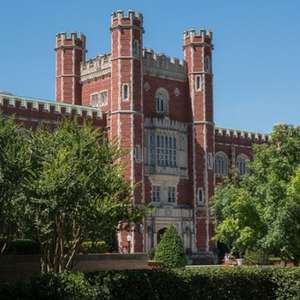NORMAN – Following a long and distinguished career in libraries, Rick Luce, University of Oklahoma Libraries’ dean, professor and Peggy V. Helmerich chair, and associate vice president for research, is announcing his retirement, effective July 1, 2018. Carl Grant, OU Libraries associate dean and chief information officer, has been named interim dean of University Libraries.
“Rick Luce has provided exceptional leadership for OU Libraries,” said OU President David L. Boren. “He is a visionary who has helped transform our library to meet current and future needs. He has helped create at OU a national model for others to follow in shaping their libraries for the future to keep them vital and relevant.”
Luce joined the university in 2012 and has led a transformation of OU Libraries. Throughout his career, he has advocated for openly accessible education and research materials. With Boren’s support, Luce created a librarian position solely dedicated to helping faculty adopt, create and utilize open education materials, as well as initiating the Alternative Textbook program which provides stipends for faculty to replace print textbooks with no-cost alternatives for students. The program to date has saved OU students more than $1.9 million in textbook costs.
“It has been a joy to culminate my professional career at OU,” said Luce. “I believe libraries are the heart of a successful university and I am deeply grateful for the support that President Boren and this administration provided to enable our transformation. The library has become a destination, a recruitment showcase, and an invaluable resource for scholarship and student success – due in part to the value of truly unique and treasured collections, and the investments in talented people and digital resources to support creativity and innovation. I am confident I will be leaving this organization in good hands under the excellent guidance of Carl Grant as interim dean, supported by our talented and dedicated staff who continue to make the OU Libraries the intellectual commons of the university.”
Luce’s vision for the internationally award-winning Peggy V. Helmerich Collaborative Learning Center in the Bizzell Memorial Library set a precedent for developing spaces across campus that support collaborative study and intellectual engagement. The success of the Helmerich Collaborative Learning Center inspired the 2017 creation of the Learning Lab, extending the HCLC model and creating a single point for students to obtain research assistance and meet with campus partners including University College Action Tutoring, the Office of Undergraduate Research and the OU Writing Center. The Zarrow Faculty and Graduate Center, a unique 22,000 square-foot campus resource supporting research and collaboration that also provides an informal scholars lounge, was opened in 2017.
Luce championed the creation of a dynamic public exhibition program, beginning with Galileo’s World, a campus wide exhibition for the university’s 125th anniversary with 20 exhibits across seven locations on all three OU campuses. A 2015 renovation of the fifth floor special collections in the Bizzell Memorial Library opened a nearly 10,000 square-foot space that supports public engagement and includes a dedicated exhibition gallery, a permanent home for the Bizzell Bible Collection, a newly-created hands-on exploration room, as well as upgrades to the classroom, reading room and collections storage.
Investments in technology-enabled resources include the creation of a flexible experimentation space, Innovation @ the Edge, which allows students, faculty and community members to experiment with emerging technologies and prototype research ideas. The OU Libraries Oklahoma Virtual Academic Library platform provided a model for virtual reality course integration to enable numerous scholarship opportunities which were previously unachievable. The development of the OU Libraries NavApp, a mobile application that guides users to resources, exhibit content and services throughout the Bizzell Memorial Library and other locations on campus, won a 2016 “Innovators Award” and named the libraries an “Education Futurist” by Campus Technology – one of only two universities in the nation to receive such recognition.
Luce also oversaw the addition of information specialists to provide consultation in digital scholarship, emerging technologies, geographic information systems, data management and data analytics. OU Libraries has become an organizing center for workshops, training, conferences and events to support these initiatives and recently opened a data analytics, design and evaluation consortium.
As dean, Luce championed the acquisition and development of unique physical collections, such as the Chinese Literature Translation Archive. He established a digitization laboratory that enables the digital preservation, online access and expanded scholarship opportunities for OU Libraries’ special collections. Investments in digital preservation and access have led to award-winning exhibition websites, a complete restructure of the libraries’ website, as well as the creation of a joint-institutional digital repository for the University of Oklahoma Libraries, Oklahoma State University Libraries, and the University of Central Oklahoma Library. The repository serves as the home for the intellectual output of these institutions, to include: digital theses and dissertations, faculty publications, open-access publications, open-educational resources, as well as institution-specific content among much more.
Luce has held numerous national and international advisory and consultative positions related to library information technologies and scholarly communications. He was a co-founder of the Open Archives Initiative, an international protocol for interoperable author self-archiving systems, and co-organized the first Berlin Declaration on Open Access to Knowledge in the Sciences and Humanities.



